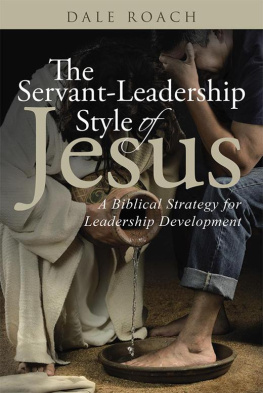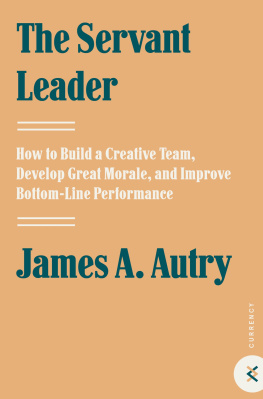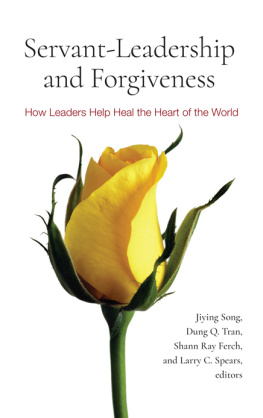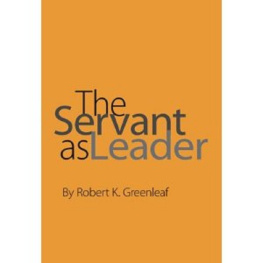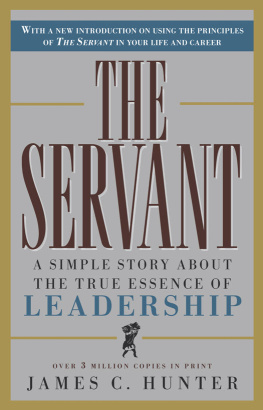Robert K. Greenleaf
Robert K. Greenleaf
Copyright 2004 by Don M. Frick
All rights reserved. No part of this publication may be reproduced, distributed, or transmitted in any form or by any means, including photocopying, recording, or other electronic or mechanical methods, without the prior written permission of the publisher, except in the case of brief quotations embodied in critical reviews and certain other noncommercial uses permitted by copyright law. For permission requests, write to the publisher, addressed Attention: Permissions Coordinator, at the address below.

Berrett-Koehler Publishers, Inc.
235 Montgomery Street, Suite 650
San Francisco, California 94104-2916
Tel: (415) 288-0260, Fax: (415) 362-2512
www.bkconnection.com
Ordering information for print editions
Quantity sales. Special discounts are available on quantity purchases by corporations, associations, and others. For details, contact the Special Sales Department at the Berrett-Koehler address above.
Individual sales. Berrett-Koehler publications are available through most bookstores. They can also be ordered directly from Berrett-Koehler: Tel: (800) 929-2929; Fax: (802) 864-7626; www.bkconnection.com
Orders for college textbook/course adoption use. Please contact Berrett-Koehler: Tel: (800) 929-2929; Fax: (802) 864-7626.
Orders by U.S. trade bookstores and wholesalers. Please contact Ingram Publisher Services, Tel: (800) 509-4887; Fax: (800) 838-1149; E-mail: customer.service@ingrampublisherservices.com; or visit www.ingrampublisherservices.com/ Ordering for details about electronic ordering.
Berrett-Koehler and the BK logo are registered trademarks of Berrett-Koehler Publishers, Inc.
First Edition
Hardcover print edition ISBN 978-1-57675-276-0
PDF e-book ISBN 978-1-60509-716-9
IDPF ISBN 978-1-60994-383-7
2010-1
Cover design: Ark Stein, The Visual Group. Cover photo courtesy of The Greenleaf Center for Servant Leadership.
To Ann McGee-Cooper.
Friend, mentor, servant-leader to so many,
and especially to me.
IX
Foreword
Peter M. Senge
In The Great Learning, Confucius said To become a leader one must first become a human being. I believe Confuciuss statement means little today because we have lost the sense of our lifes journey as one of becoming a human being. And, with that loss, we have lost the foundation of lived experience for developing as leaders.
As much as anything, I believe it is this loss that has motivated the extraordinary interest in Robert Greenleafs work around the world in the past two decades. When Greenleaf wrote his essay, The Servant as Leader in 1970, he could hardly have imagined the growing interest the next 30 years would bring. Initially, the essay predictably attracted a small group of ready converts from religious organizations, from organizations, like some in the military, where values-based approaches to leadership were well established, and from people already drawn to a developmental approach to leadership. But today, the interest is far broader and more diverse, and it has spread well beyond the US, even beyond the Judeo-Christian tradition that was so important for Greenleafs inspiration. The Servant as Leader has been translated into more than a dozen languages, and the Greenleaf Center for Servant Leadership in Indianapolis is now a global hub for operations in Australia/New Zealand, the UK, Canada, the Netherlands, the Philippines, Singapore, Japan, Korea, and South Africa.
But there are many reasons for the growing interest in leadership, and it is easy to force-fit Greenleafs work to fill needs for which it is ill-suited. Much of what is written today on the subject focuses on power, either explicitly or implicitly. This occurs because leadership has, in its colloquial use, become a synonym for boss-shipas when we use the word leader to refer to a person in the position of greatest authority. This isX tragic and undermines progress in developing real leadership. If the word leader is a mere synonym for boss or positional authority, it has no meaning at all. Two words to describe the same phenomenon mean that one is redundant. Moreover, being a boss hardly guarantees being a leader. Many occupy positions of great authority and contribute little leadership. I believe much of the contemporary fascination with leadership reflects our obsession with positional power, and with the wealth we expect to accompany it. This is why so much of what is written about leadership focuses on presidents and CEOs and why this writing contributes so little.
Still, despite frequently misusing the word as a marker for positional authority, it also points at issues we all sense as crucial. Indeed, leadership, or the lack thereof, seems to relate to many ailments that we see everywhere in the modern worldabuse of power, obsessive focus on the short term over the longer term, and a profound loss of purposefulness.
These problems sit much closer to Greenleafs concerns, but I think it is a mistake for people to look to servant leadership as a kind of formulaic solution to them. Many seem to treat the recent corporate malfeasance witch hunt catalyzed by the Enron, Worldcom, and Tyco scandals as a singular occurrence. But it followed by only a decade the infamous junkbond scandal in the U.S. that put Michael Milliken and other highly successful dealmakers into jail. I recall much chest thumping by business schools about integrating ethics into their programs in the early 1990s and even a few endowed professorships on the subject. Yet it would take some pretty strong rose-tinted lenses to assess any real progress in business practice that resulted. As concerns with abuse of power rise to the surface once again, it is a mistake to look to Greenleaf as a dispenser of an ethical antidote. Ethics became a kind of moral window dressing on MBA programs in the 1990s because these programs still held to premises that remain unchallengedsuch as unquestioned views that the purpose of business is to make money and that those most successful at it are those whose passion for this purpose runs deep. Challenging such assumptions lays closer to Greenleafs real concerns. For above all, Robert Greenleafs writings were concerned with what motivates us and how we might cultivate deeper sources of motivation.
I first read The Servant as Leader in 1982, and although there are many ideas I keep rediscovering when I return to the essay, there is one that I have never forgotten from that first reading.
XI
At the end, Greenleaf relates a vignette from the Herman Hesse story, The Journey to the East, around which he weaves many key points of the essay. The scene comes at the end of Hesses story, after the narrator has found the secret spiritual order for which he had searched for years, and after discovering that his servant Leo, without whose physical and spiritual ministrations he would have succumbed during his odyssey, is the head of the order. As he ponders a small sculpture of him and Leo, he notices that it seemed as if my image was adding to and flowing into Leos It seemed that in time only one would remain: Leo. Hesse then adds, As I stood there and tried to understand what I saw, I recalled a short conversation I had had with Leo during the festive days at Bremgarten. We talked about how the creations of poetry become more vivid and real than the poets themselves.




